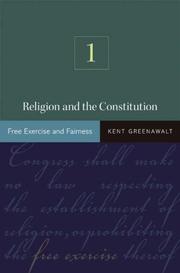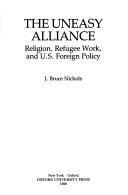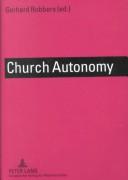| Listing 1 - 10 of 17 | << page >> |
Sort by
|
Book
ISBN: 0896331784 Year: 1993 Publisher: Washington, DC Ethics and Public Policy Center
Abstract | Keywords | Export | Availability | Bookmark
 Loading...
Loading...Choose an application
- Reference Manager
- EndNote
- RefWorks (Direct export to RefWorks)
Book
ISBN: 0674074114 0674072669 0674074157 9780674074118 9780674072664 Year: 2013 Publisher: Cambridge, MA
Abstract | Keywords | Export | Availability | Bookmark
 Loading...
Loading...Choose an application
- Reference Manager
- EndNote
- RefWorks (Direct export to RefWorks)
When it comes to questions of religion, legal scholars face a predicament. They often expect to resolve dilemmas according to general principles of equality, neutrality, or the separation of church and state. But such abstractions fail to do justice to the untidy welter of values at stake. Offering new views of how to understand and protect religious freedom in a democracy, The Tragedy of Religious Freedom challenges the idea that matters of law and religion should be referred to far-flung theories about the First Amendment. Examining a broad array of contemporary and more established Supreme Court rulings, Marc DeGirolami explains why conflicts implicating religious liberty are so emotionally fraught and deeply contested. Twenty-first-century realities of pluralism have outrun how scholars think about religious freedom, DeGirolami asserts. Scholars have not been candid enough about the tragic nature of the conflicts over religious liberty-the clash of opposing interests and aspirations they entail, and the limits of human reason to resolve intractable differences. The Tragedy of Religious Freedom seeks to turn our attention from abstracted, absolute values to concrete, historical realities. Social history, characterized by the struggles of lawyers engaged in the details of irreducible conflicts, represents the most promising avenue to negotiate legal conflicts over religion. In this volume, DeGirolami offers an approach to understanding religious liberty that is neither rigidly systematic nor ad hoc, but a middle path grounded in a pluralistic and historically informed perspective.
Book
ISBN: 1316354830 1316361233 1316363236 131636223X 1316364232 1139061151 131635783X 1107016509 1108448046 9781108448048 9781107016507 1316348830 9781316357835 9781139061155 Year: 2015 Publisher: Cambridge
Abstract | Keywords | Export | Availability | Bookmark
 Loading...
Loading...Choose an application
- Reference Manager
- EndNote
- RefWorks (Direct export to RefWorks)
In recent decades, religion's traditional distinctiveness under the First Amendment has been challenged by courts and scholars. As America grows more secular and as religious and nonreligious convictions are increasingly seen as interchangeable, many have questioned whether special treatment is still fair. In its recent decisions, the Supreme Court has made clear that religion will continue to be treated differently, but we lack a persuasive account of religion's uniqueness that can justify this difference. This book aims to develop such an account. Drawing on founding era thought illumined by theology, philosophy of religion, and comparative religion, it describes what is at stake in our tradition of religious freedom in a way that can be appreciated by the religious and nonreligious alike. From this account, it develops a new framework for religion clause decision making and explains the implications of this framework for current controversies regarding protections for religious conscience.
Book
ISBN: 9780195326246 0195326245 Year: 2010 Publisher: Oxford Oxford University Press
Abstract | Keywords | Export | Availability | Bookmark
 Loading...
Loading...Choose an application
- Reference Manager
- EndNote
- RefWorks (Direct export to RefWorks)
Sociology of religion --- United States --- Church and state --- Freedom of religion --- Religion and law --- Church history --- Church and state - United States --- Freedom of religion - United States --- Religion and law - United States --- United States - Church history --- United States of America
Book
ISBN: 9780674724754 0674724755 0674730135 0674730968 9780674730137 Year: 2014 Publisher: Cambridge, MA
Abstract | Keywords | Export | Availability | Bookmark
 Loading...
Loading...Choose an application
- Reference Manager
- EndNote
- RefWorks (Direct export to RefWorks)
Familiar accounts of religious freedom in the United States often tell a story of visionary founders who broke from centuries-old patterns of Christendom to establish a political arrangement committed to secular and religiously neutral government. These novel commitments were supposedly embodied in the religion clauses of the First Amendment. But this story is largely a fairytale, Steven Smith says in this incisive examination of a much-mythologized subject. The American achievement was not a rejection of Christian commitments but a retrieval of classic Christian ideals of freedom of the church and of conscience. Smith maintains that the First Amendment was intended merely to preserve the political status quo in matters of religion. America's distinctive contribution was, rather, a commitment to open contestation between secularist and providentialist understandings of the nation which evolved over the nineteenth century. In the twentieth century, far from vindicating constitutional principles, as conventional wisdom suggests, the Supreme Court imposed secular neutrality, which effectively repudiated this commitment to open contestation. Instead of upholding what was distinctively American and constitutional, these decisions subverted it. The negative consequences are visible today in the incoherence of religion clause jurisprudence and the intense culture wars in American politics.
Freedom of religion --- Church and state --- Liberté religieuse --- Eglise et Etat --- Church and state -- United States. --- Freedom of religion -- United States. --- Constitutional Law - U.S. --- United States --- American religious freedom --- Christian-Paganism --- the First Amendment --- religion

ISBN: 9780691141145 0691125821 9780691125824 1400827523 9786612721878 1282721879 0691141134 9781400827527 0691141142 Year: 2009 Publisher: Princeton, NJ
Abstract | Keywords | Export | Availability | Bookmark
 Loading...
Loading...Choose an application
- Reference Manager
- EndNote
- RefWorks (Direct export to RefWorks)
Balancing respect for religious conviction and the values of liberal democracy is a daunting challenge for judges and lawmakers, particularly when religious groups seek exemption from laws that govern others. Should members of religious sects be able to use peyote in worship? Should pacifists be forced to take part in military service when there is a draft, and should this depend on whether they are religious? How can the law address the refusal of parents to provide medical care to their children--or the refusal of doctors to perform abortions? Religion and the Constitution presents a new framework for addressing these and other controversial questions that involve competing demands of fairness, liberty, and constitutional validity. In the first of two major volumes on the intersection of constitutional and religious issues in the United States, Kent Greenawalt focuses on one of the Constitution's main clauses concerning religion: the Free Exercise Clause. Beginning with a brief account of the clause's origin and a short history of the Supreme Court's leading decisions about freedom of religion, he devotes a chapter to each of the main controversies encountered by judges and lawmakers. Sensitive to each case's context in judging whether special treatment of religious claims is justified, Greenawalt argues that the state's treatment of religion cannot be reduced to a single formula. Calling throughout for religion to be taken more seriously as a force for meaning in people's lives, Religion and the Constitution aims to accommodate the maximum expression of religious conviction that is consistent with a commitment to fairness and the public welfare.
Religious studies --- United States --- Church and state --- Freedom of religion --- Freedom of religion - United States --- Church and state - United States --- Etats-Unis --- freedom of religion --- Church and State --- law and religion --- constitution
Book
ISBN: 9781409407928 9781409407935 1409407934 1317166272 1317166264 1283318792 9786613318794 9781315572024 9781317166252 9781317166269 9781138260856 1315572028 1409407926 Year: 2011 Publisher: Farnham, Surrey, England ; Burlington, Vt. : Ashgate,
Abstract | Keywords | Export | Availability | Bookmark
 Loading...
Loading...Choose an application
- Reference Manager
- EndNote
- RefWorks (Direct export to RefWorks)
The role of religion as a contentious and motivating force in society is examined here through the lens of the church-state dynamic in countries with three very different approaches; the United Kingdom, the United States, and Germany. This book describes the components of each, illustrating their operation, examining their relative advantages and disadvantages, and delving deeply into relevant case law from all three countries in order to examine the development of their doctrines and to determine what, if anything, any of the models might learn from the others.

ISBN: 0195042743 9780195042740 Year: 1988 Publisher: New York
Abstract | Keywords | Export | Availability | Bookmark
 Loading...
Loading...Choose an application
- Reference Manager
- EndNote
- RefWorks (Direct export to RefWorks)
Sociology of religion --- Sociology of minorities --- International relations. Foreign policy --- United States --- Church work with refugees. --- Church and state --- Ecclesiastical law --- War victims --- Humanitarianism. --- Freedom of religion --- United States. --- Legal status, laws, etc. --- Foreign relations --- 1945-1989 --- Humanism --- 20th century --- Church and state - United States. --- Ecclesiastical law - United States. --- War victims - Legal status, laws, etc. --- Freedom of religion - United States. --- United States of America
Book

ISBN: 224706146X 9782247061464 Year: 2005
Abstract | Keywords | Export | Availability | Bookmark
 Loading...
Loading...Choose an application
- Reference Manager
- EndNote
- RefWorks (Direct export to RefWorks)
Laicism --- Church and state --- Religion and state --- Freedom of religion --- Laïcité --- Eglise et Etat --- Religion et Etat --- Liberté religieuse --- Laicité --- Laïcité --- Liberté religieuse --- United States --- Congresses --- Constitution (Law) --- Laicism - United States --- Church and state - United States --- Religion and state - United States --- Freedom of religion - United States --- Laicité - Etats-Unis --- Eglise et Etat - Etats-Unis --- Religion et Etat - Etats-Unis --- Liberté religieuse - Etats-Unis

ISBN: 3631362234 9783631362235 Year: 2001 Publisher: Frankfurt am Main Peter Lang Europäischer Verlag der Wissenschaften
Abstract | Keywords | Export | Availability | Bookmark
 Loading...
Loading...Choose an application
- Reference Manager
- EndNote
- RefWorks (Direct export to RefWorks)
Church and state --- Freedom of religion --- 322 --- Godsdienstige tolerantie. Godsdienstpolitiek --- 322 Godsdienstige tolerantie. Godsdienstpolitiek --- Church and state - Europe - Congresses. --- Freedom of religion - Europe - Congresses. --- Church and state - United States - Congresses. --- Freedom of religion - United States - Congresses. --- church autonomy --- the European Union --- freedom of religion --- freedom of belief --- law and religion --- state and church
| Listing 1 - 10 of 17 | << page >> |
Sort by
|

 Search
Search Feedback
Feedback About UniCat
About UniCat  Help
Help News
News